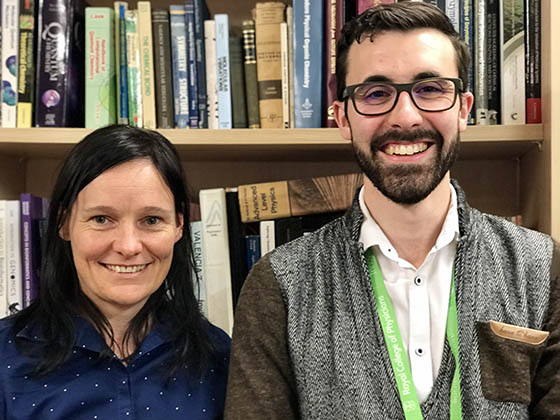A new collaboration of university researchers and clinicians has been funded £100,000 to drive forward earlier detection of breast cancer.
The consortium, co-led by Dr Philippe Wilson from De Montfort University Leicester (DMU) and Professor Mel Mather, University of Nottingham, aims to develop and improve sensor technologies for liquid biopsy - using molecular markers in blood or other bodily fluids to detect disease.

A tiny diamond is at the heart of the tech, which would also allow for non-invasive tests for patients.
Dr Wilson, VC2020 Lecturer in Biological Chemistry and Cheminformatics, said: "One of the most common diagnostic tests in medicine is MRI scanning, which looks at the way water will behave differently in diseased compared with healthy tissue.
"We're using similar principles but looking one step down at the composition of urine, saliva, blood and nipple aspirate fluid.
"The real innovation is that we can use an electron trapped in the defect of a microscopic diamond and read out its spin properties using light.
"So urine from a patient with cancer will produce a different signal to a sample from a healthy person.
"The advantage is it is miniature, low cost, we can do it at patient's side or even without the patient and it's non-invasive."
The leadership team also includes Professor Mangesh Thorat, from Queen Mary University of London, and DMU's Professor Martin Grootveld. Professor Jacqui Shaw, University of Leicester, and Dr Victoria James, University of Nottingham, are collaborators.
Funding comes from Cancer Research UK (CRUK), the Engineering and Physical Sciences Research Council, and the Science and Technology Facilities Council.
Dr Wilson, who earlier this year was named on Forbes' 30 Under 30 list, said: "It's an honour to be funded by this very prestigious research council and charity partnership.
"The onus is to do something ground breaking for science, innovation and outreach."
RELATED NEWS
Pioneering technology for the detection of diseases arrives at DMU
Interested in studying at DMU? Book your place at our next Open Day
DMU academic appointed to government committee
The idea was born at CRUK's Early Detection Innovation Sandpit and Award workshop in Oxfordshire, which aimed to catalyse new multidisciplinary collaborations to drive forward earlier detection of cancer.
Applying as individuals, the consortium - Quantum Leapers: Early Detection of Breast Cancer through Optically Detected Magnetic Resonance - came together after a series of activities facilitated by CRUK's Dr Alexis Webb.
Professor Thorat's work on breast cancer biomarkers will allow access to thousands of samples, while Professor Shaw is among the first to recognise the potential of liquid biopsies for early detection.
Professor Mather's lab is optimising the tech, while Dr Wilson will use high-spec instruments at DMU to see how the new tech compares to current practice and collaborate with Professor Grootveld on data analysis. Dr James' input will enable the team to look at cancer in animals.
Professor Mather, whose family has been touched by cancer, said: "For me it's about how much difference you make in the real world. It's humbling to see patients and have the opportunity to apply your skills to help."
The initial funding is for a 12-month period, by which time the consortium aims to have a working prototype of the tech, proof it will be successful in early detection of cancer and clinically actionable metrics.
The consortium is also preparing funding bids totalling £1 million to further their research, with letters of support already received from manufacturers and industry.
Posted on Friday 26 October 2018